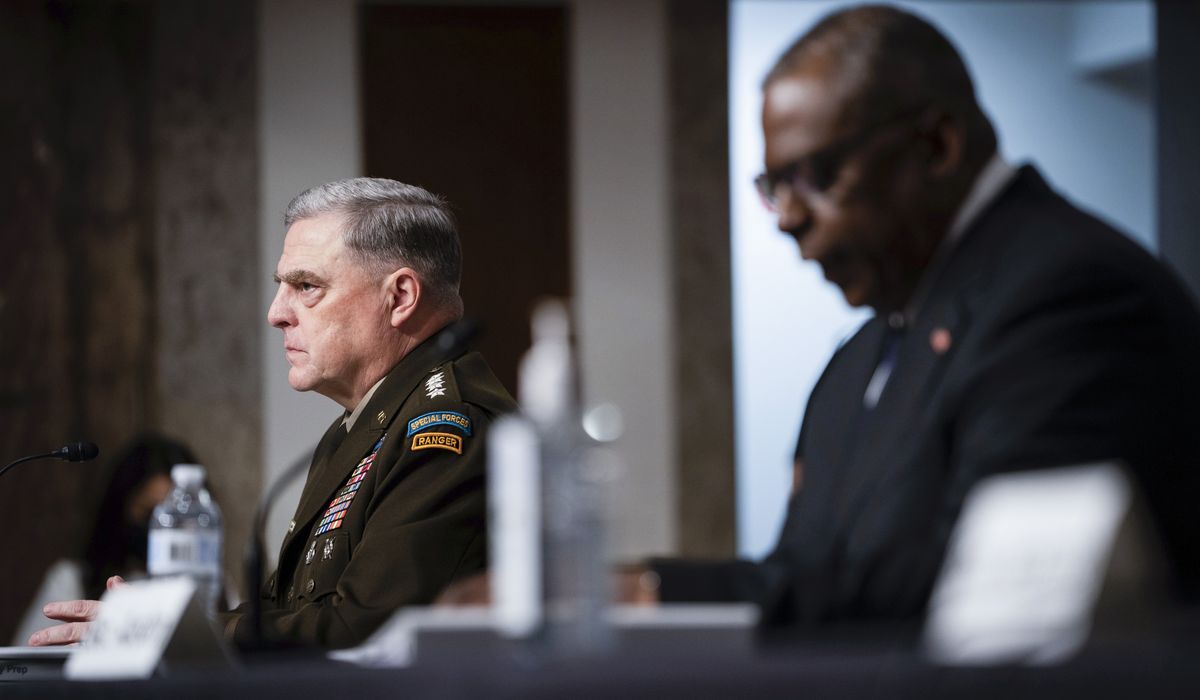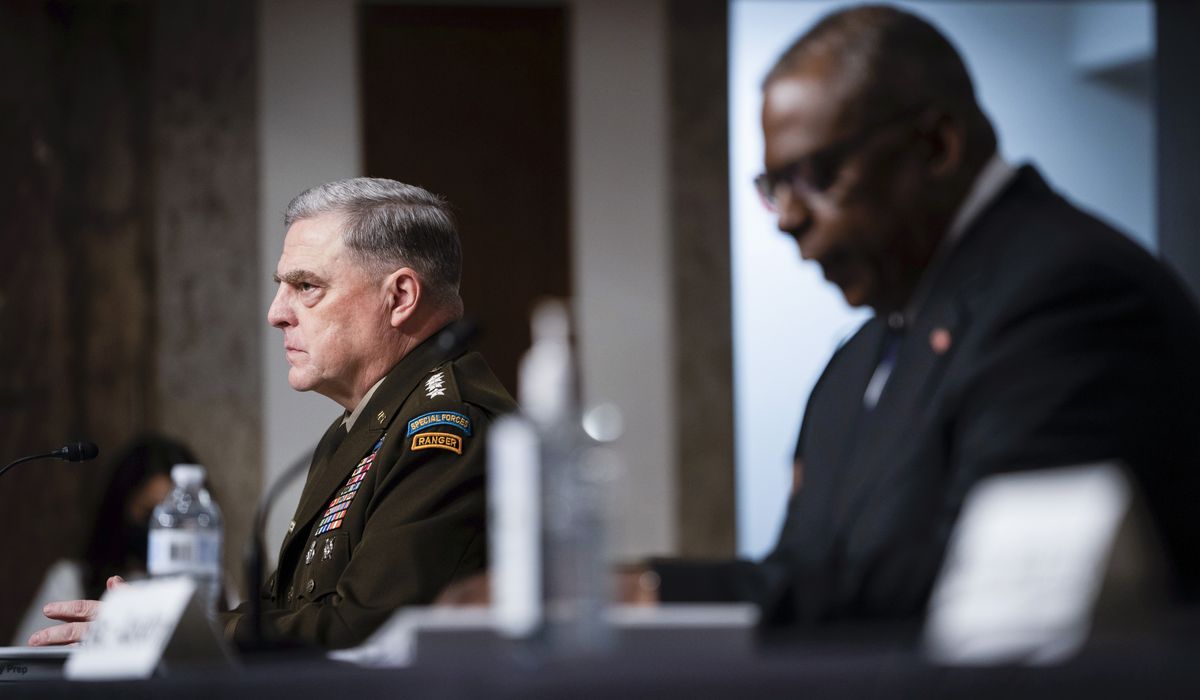
Top military leaders on Tuesday confirmed that they advised the White House to keep at least 2,500 troops in Afghanistan and to reject an arbitrary timeline for withdrawal, seemingly contradicting President Biden, who said the Pentagon brass was on board with his Aug. 31 exit date regardless of conditions on the ground and warning signs of a likely Taliban takeover.
The acknowledgments from Joint Chiefs of Staff Chairman Gen. Mark A. Milley and Gen. Kenneth F. McKenzie Jr., the head of U.S. Central Command, were among the most significant revelations from a heated hearing before the Senate Armed Services Committee. It was the first such hearing with Defense Department leadership since Afghanistan fell to the Taliban on Aug. 15. Defense Secretary Lloyd Austin also appeared before the panel.
It was an uncomfortable six hours of testimony for all three witnesses. They faced questions about decision-making that led to the hasty pullout, the chaotic and violent finals days of the U.S. combat mission, and the problems of fighting terrorism without a U.S. military presence inside Taliban-ruled Afghanistan.
Though hesitant to publicly contradict the president and stressing that they wouldn’t divulge the details of private conversations, Gens. Milley and McKenzie seemed to refute several points made by Mr. Biden and his top aides over the past six weeks. Both officers stated flatly that al Qaeda remains in Afghanistan, clashing with the president’s late-August claim that the terrorist group is “gone” from the country.
Gen. Milley conceded that America had suffered “damage” to its credibility abroad because of the rushed and poorly coordinated U.S. and allied withdrawal from Afghanistan.
The most glaring discrepancy emerged when senators pressed Gens. Milley and McKenzie on exactly what they recommended to Mr. Biden during the spring and early summer. It was a crucial period for the administration as it weighed whether to move ahead with a full withdrawal from Afghanistan that was set into motion under the Trump administration.
“My assessment was back in the fall [of 2020], and it remained consistent throughout, that we should keep a steady state of 2,500” troops in the country, Gen. Milley told the panel.
Gen. McKenzie took a similar position.
“I’ve stated consistently that my position was if you go below 2,500, you’re going to look at the collapse of the Afghan military” and the U.S.-backed government in Kabul, he said.
In August, ABC News host George Stephanopoulos pressed Mr. Biden on whether any top Pentagon leaders directly disagreed with his decision to stick by the withdrawal date and pull all U.S. troops after 20 years of war, regardless of the situation on the ground.
“No, not in terms of whether we were going to get out in a time frame, all troops, they didn’t argue against that,” Mr. Biden said. “No one said that to me that I can recall.”
As vice president under President Obama, Mr. Biden opposed a U.S. troop surge in Afghanistan a decade ago. He made known his unhappiness that, as he said, U.S. military leaders had boxed in Mr. Obama and leaked selectively to the press to prevent a drawdown of the mission.
There was confusion Tuesday as to whether the officers delivered their recommendations to Mr. Biden face-to-face. All three witnesses said they were confident that the president was aware of their assessments and took them into account, but they did not say directly that they presented the recommendations in person.
“Their input was received by the president and considered by the president,” Mr. Austin said.
White House press secretary Jen Psaki noted in her daily briefing that Mr. Biden said in the ABC interview that his advisers were “split” on whether to keep troops in Afghanistan and that the president made a command decision after hearing all sides in the debate.
“There was a range of viewpoints, as was evidenced by their testimony today, that were presented to the president, that were presented to his national security team, as would be expected,” Ms. Psaki said.
Mr. Biden “was just not willing” to expand or extend the U.S deployment as the generals were urging, she said. “He didn’t think it was in the interest of the American people or the interest of our troops.”
Republicans seized on the obvious disconnect between the White House and the Pentagon. They specifically blasted Mr. Biden for either lying or forgetting about the advice he received from his generals.
“These are dramatic, obvious falsehoods that go to the very heart of the foreign policy fiasco we have all witnessed,” said Sen. Dan Sullivan, Alaska Republican.
Gen. Milley sketched out an even broader disagreement with the commander in chief. He said flatly that the kinds of deadlines that President Trump and Mr. Biden put on the Afghanistan withdrawal were mistakes.
“Two presidents in a row put a date on it,” he said. “My advice is don’t put specific dates. Make things conditions-based.”
‘We were ready’
In his lengthy opening statement, Mr. Austin defended the Pentagon’s handling of the withdrawal. Despite the chaotic scenes at the airport in Kabul — including an Islamic State terrorist attack that killed 13 U.S. troops and more than 170 Afghan civilians — he insisted that the military was well-prepared for the Afghanistan endgame.
“We wanted to be ready. And we were,” Mr. Austin said as he pushed back on the widely held perception that the Biden administration was caught flat-footed when the Taliban swept Kabul in less than two weeks.
“To be clear, those first two days were difficult,” he said. “We all watched with alarm the images of Afghans rushing the runway and our aircraft. We all remember the scenes of confusion outside the airport. But within 48 hours, our troops restored order and the process began to take hold.”
The U.S. failed to get all Americans out of Afghanistan before Aug. 31, another promise Mr. Biden made repeatedly. It’s unclear how many Americans remain in the country. State Department officials have estimated that 100 remain in Afghanistan, though some think the number is much higher.
Even Democrats on the Senate panel expressed anger at the apparent lack of strategy.
“They have targets on their back. Their situation is increasingly urgent and desperate,” Sen. Richard Blumenthal, Connecticut Democrat, said of the Americans left behind. “I have been frustrated by the lack of someone in charge and the lines of authority, a point person. We need an evacuation czar, someone who will develop a plan and supervise actions so we can get out of Afghanistan the Americans who remain there.”
The State Department has said the U.S. expects the Taliban to allow American citizens to exit the country by land or on civilian flights, though critics fear the Taliban may hold Americans hostage in exchange for economic aid, formal diplomatic recognition from Washington or other concessions.
Although Democrats defended the full withdrawal from Afghanistan and the U.S.-led Kabul airlift, Gen. Milley said the entire ordeal hurt America’s reputation abroad. Biden political appointees have repeatedly denied that assessment.
“I think our credibility with allies and partners around the world and with adversaries is being intensely viewed by them to see which way this is going to go. And I think ‘damage’ is one word that could be used, yes,” Gen. Milley said.
Responding to a question from Sen. Tom Cotton, Arkansas Republican, Gen. Milley said he never considered resigning when Mr. Biden ignored his counsel.
“It would be an incredible act of political defiance, for a commissioned officer to just resign because my advice is not taken,” he said. “This country doesn’t want generals figuring out what orders we are going to accept and do or not. That’s not our job.”
The witnesses pushed back against a central Republican argument that the military should have kept open the giant Bagram Airfield north of Kabul for the duration of the American presence in Afghanistan. The U.S. turned over that base to the Afghan military in early July, and critics say it could have been an invaluable asset during the withdrawal.
Mr. Austin disagreed.
“Retaining Bagram would have required putting as many as 5,000 U.S. troops in harm’s way just to operate and defend it, and it would have contributed little to the mission,” he said. “The distance from Kabul also rendered Bagram of little value during the evacuation.”








